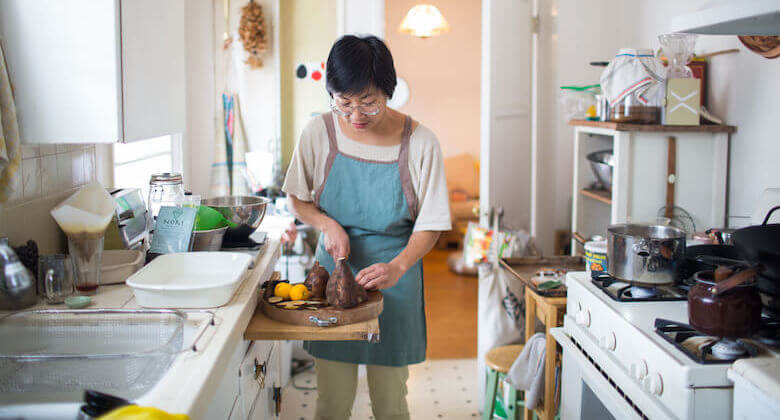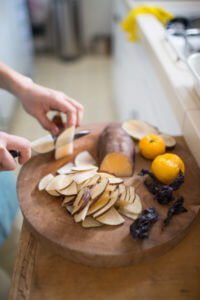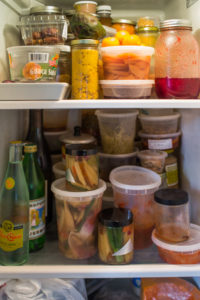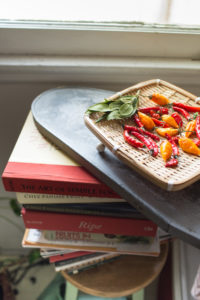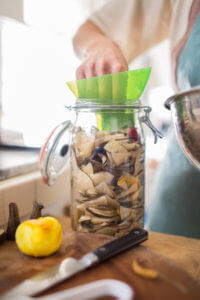
![]() Californians love a good pickle. From the Jewish delis on Fairfax to all the hipster bowls, there is rarely a dish that is served without the pop of a little fermentation or a vinegary brine. As we visited every specialty food shop and salad destination in L.A., we realized we were missing a little hands-on instruction in the realm of fermentation.
Californians love a good pickle. From the Jewish delis on Fairfax to all the hipster bowls, there is rarely a dish that is served without the pop of a little fermentation or a vinegary brine. As we visited every specialty food shop and salad destination in L.A., we realized we were missing a little hands-on instruction in the realm of fermentation.
I met Jessica while she was behind the register at my favorite Highland Park market, Cookbook. Jessica Wang is a grocer by day and an underground fermentation enthusiast by night. She was trained as a pastry chef, working in restaurants and running her own side business selling homemade hand pies filled with delightful things like fresh coconut meat and homemade guava paste. But all those sweets were taking their toll on her health, so she pivoted to focus on the world of living foods, from home-brewed kombucha to kimchi.
Jessica rang me up for an eclectic selection of kimchis and other pickled delights. Within five minutes of chatting, she’d invited me to her Pasadena kitchen, where I later would taste a rainbow of fermented items stacked like Jenga in her fridge. The smell upon opening her front door was like home. Not my home, per se, but like my fantasy version home. There was a pot of Thai oxtail soup on the stove, chili pods and cardamom simmering on the surface. The contents of the galley kitchen spilled forth into the living room, stacked with vintage cookware from Jessica’s now defunct Etsy shop, and The Art of Fermentation lay open next to her bed.
Working at a specialty food shop with A+ produce means Jessica has unfettered access to ingredients like yuzu (a floral Japanese citrus), and local nori. A friend had recently gifted Jessica a few yacon, a Peruvian root vegetable that pretends to be a potato, but actually tastes more like sweet and crunchy Asian pear. Somehow, even after traveling to Peru twice, I had yet to encounter this mysterious vegetable. Jessica tells me it’s a relative of the Jerusalem artichoke, with a very similar bite but with added sweetness. It’s an Asian pear masquerading as a tuber.
I watched as she turned this trinity of exotic ingredients into a simple ferment. She walked me step-by-step through a process that took no more than 15 minutes. The recipe is a basic one that relies on a formula of 2.5 percent salt to whatever the weight of the vegetable you are fermenting. So, can’t find yacon? No problem! Just grab some Asian pear or jicama, and follow the steps below.

To find out more about Jessica’s underground pickle subscription service and hand pies, contact her at @piquenique_la.
Yacon yuzu nori chili pickle
920 grams (about 2 pounds) yacon (substitute with jicama, Asian pear or sunchokes)|
23 grams sea salt, or 2.5 percent of the weight of yacon
1 yuzu
3 grams natural nori seaweed (or other thin variety of seaweed)
2–3 dried whole red chilies
Have a clean 1½-quart fermenter jar ready.
Clean yacon and yuzu under running water, with a gentle brush if necessary. Dry with a clean towel.
Cut yacon lengthwise into quarters. Slice thinly crosswise, into ¼-inch thick fans. Use a mandolin if you have one! Toss by hand with salt in a large bowl.
Peel strips of yuzu rind with a vegetable peeler.
Break up seaweed into small bits by hand, or cut into thin slivers with scissors. The volume of seaweed you should end up with is about ¼ cup loosely packed.
Add yuzu peel, seaweed and dried chili to yacon and salt mixture and toss gently, then pack into jar. Put a weight directly on top of the vegetables to submerge them in the brine created by the yacon and sea salt. Seal jar and keep in a dark cool place (around 75°) for 6 days. Taste, and if it’s tart enough to your liking, transfer the pickles to your refrigerator to slow the fermentation and enjoy the crunchy citrusy briny treat.


